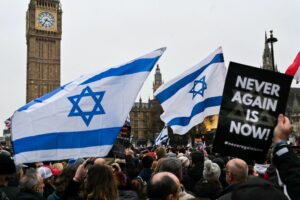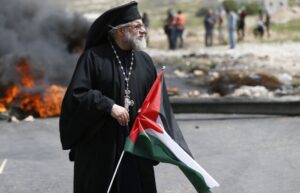The most dangerous piece of real estate on earth can be found in the Old City of Jerusalem. An elevated piazza, looming over the warren of lanes below, it’s known as Temple Mount by Jews and the Haram al-Sharif by Muslims. Venerated by both religions, this tangle of bricks and stone is also steeped in mythology. And soon enough, if a group of Jewish extremists get their way, it could spark a cataclysm.
For Jews, Temple Mount is where God ordered Abraham to sacrifice his son Isaac. As Abraham set out to obey God’s instruction, an angel appeared to stay his hand. A ram is caught and sacrificed instead — a founding event of Jewish theology. This place would later become the site of Solomon’s Temple, the spot where God was called down to be among His people, and where priests made daily sacrifices for the atonement of the people’s sins. Even before the Babylonians destroyed this First Temple in 587 BC, violence and religion sat side by side here.
In 70 AD, the Romans razed the so-called Second Temple as punishment for Jewish rebellion. They built a shrine to Jupiter on the site of Jewish sacrifice, and slaughtered pigs there as an insult. Later, Christians would use the site as a rubbish tip, doubtless for similar reasons. It became a holy space again only with the Arab conquest of Jerusalem, where the Al-Aqsa Mosque was built in the seventh century. It remains the oldest surviving example of Islamic architecture. This was where Muhammad was said to have landed on the back of a winged horse to lead Abraham, Moses and Jesus in prayer. For Muslims, then, this is the spot from where Muhammad ascended to heaven.
Ever since the Crusaders were ejected from Jerusalem by Saladin, the hill has been administered by Muslims. But when Israeli paratroopers re-took East Jerusalem during the Six-Day war, in 1967, they raised the Israeli flag over the Temple Mount compound. Watching with his binoculars a few miles away, Defence Minister Moshe Dayan ordered the soldiers to take the flag down. “Do you want to set the Middle East on fire?” he apparently barked down the radio. The flag was removed. For a brief moment, Jews had taken back control of Temple Mount. But even in the midst of victory, Dayan knew this was a step too far. The third-holiest site on earth to Muslims, the Star of David had the potential to engulf the region in an apocalypse of Biblical proportions.
To this day, Temple Mount is administered by Jordan. Even the Rabbis have been remarkably consistent in forbidding Jews from climbing up the hill. The place is just too holy, and without being properly purified according to ancient custom, the very act of walking on the site constitutes an act of defilement. Last week, Prime Minister Benjamin Netanyahu issued a very direct statement to his Security Cabinet that there has been no change to the status quo regarding Temple Mount — nor would there be. Even Netanyahu knows how dangerous such a prospect would be.
But the very fact the prime minister felt forced to clarify Israel’s position is worrying enough.
After the Babylonians destroyed the original Temple, the prophet Haggai urged his people that rebuilding was an absolute priority: “Is it a time for you to live in your panelled houses, while this house lies in ruins?” He then explains why things haven’t been going well for the people of Israel. “Because my house lies in ruins, while all of you hurry off to your own houses. Therefore the heavens above you have withheld the dew, and the earth withheld its produce.”
There have always been Jews who believe this instruction applies to the present as well as the past. Until the Temple is rebuilt, they think, God will not act with favour towards his people. This Third Temple movement has long existed as an extremist fringe. But the Hamas war has emboldened it.
“Bless the state of Israel, God almighty, please unite our hearts to rebuild your temple,” proclaims Yehuda Glick, a US born rabbi and the most prominent of the leaders of the movement. Previously arrested for trying to go up to the Temple Mount to pray, now he walks there freely with groups of settlers, protected by the very police who would once have arrested them and encouraged by those at the highest level of government. Powerful people are now saying openly what was once one said quietly. As Yitzhak Pindrus, a member of the Knesset, said earlier this year: “We are hoping that soon the Third Temple will be built there, and that we’ll be able to eat there from the Passover sacrifices.”
Most powerful of all is Itmar Ben-Gvir, the National Security Minister and leader of the far-right Jewish Power party, a man who hands out rifles to settlers and has a picture of mass-murderer Baruch Goldstein on his wall. Talking of Temple Mount he recently stated: “If I could do anything I wanted, I would put an Israeli flag on the site.” Since taking office, Ben-Gvir has visited the site at least half-a-dozen times.
Repeatedly challenged if he wanted to build a synagogue there, Ben-Gvir finally admitted he would. Less messianic members of the Israel cabinet have been quick to oppose him. Defence Minister Yoav Gallant said: “Challenging the status quo on the Temple Mount is a dangerous, unnecessary and irresponsible act. Ben-Gvir’s actions endanger the national security of the state of Israel.” The head of Shin Bet, Israel’s internal security agency, said Ben-Gvir’s actions would “lead to much bloodshed and will change. The face of the state of Israel beyond recognition.”
Yet an article in Haaretz reports that Ben-Gvir and others are secretly planning for a Third Temple. According to biblical instruction, only someone suitably purified can walk up to the Temple Mount to begin the task of rebuilding the Temple. And the ancient ceremony of purification requires a perfect red heifer to be burnt. Today, though, the heifers are being bred, the altar has been built, priests are being recruited, and messianic extremists are gathering: first to pray, but with a longer-term aim of flattening Al-Aqsa and building a Jewish temple in its place. And the people who believe this are the same people with whom Netanyahu has gone into coalition, and together they are running the country.
This November, The Third Temple by Yashai Sarid, will be published in English. Set in the future, Sarid’s original is narrated by someone whose father “removed the mosques from the top of the temple” — and where, in retaliation, the coastal cities of Israel are destroyed by a nuclear fire. His novel highlights the huge division in Israeli society, symbolised by the contrast between secular Tel Aviv and an increasingly zealous Jerusalem. These imagined future divisions could be seen recently, however, as tens of thousands of mostly secular Israelis protested on the streets of Tel Aviv, furious about the way the Netanyahu government, and their religiously zealous acolytes, seem to have put the messianic narrative about Israel’s place in the world above the desire to make peace with the Palestinians. With men such as Ben-Gvir undermining much of the sympathy many of us have for Israel’s legitimate defence by casting the story of Israel’s purpose as being one of fulfilling some greater messianic calling — rather than as a safe haven for the Jewish people.
This is not to abandon any sense of theology when thinking about Israel. But what many zealots fail fully to register is that peace is the ultimate symbol of the messianic age: the lion laying down with the lamb, as the prophet Isaiah put it. Written after the first destruction of the Temple, Isaiah experienced the full horror of a devastated Israel. “Our holy and beautiful house, where our Fathers praised you, has been burned by fire and all our pleasant places have become ruins.” Sarid’s dystopian novel is a terrifying prophecy of this happening once again.
Disclaimer
Some of the posts we share are controversial and we do not necessarily agree with them in the whole extend. Sometimes we agree with the content or part of it but we do not agree with the narration or language. Nevertheless we find them somehow interesting, valuable and/or informative or we share them, because we strongly believe in freedom of speech, free press and journalism. We strongly encourage you to have a critical approach to all the content, do your own research and analysis to build your own opinion.
We would be glad to have your feedback.
Source: UnHerd Read the original article here: https://unherd.com/




